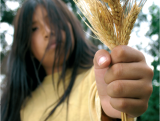27 October 2003, Rome -- Governments, non-governmental organizations (NGOs) and other civil society groups from around the world started a three-day meeting at FAO today to debate how states should best implement a fundamental human right, the right to food.
According to international law everyone has the right to adequate food and the fundamental right to be free from hunger.
How to translate these principles into practice is on the agenda of an Intergovernmental Working Group on the Right to Food, which came together for its second meeting.
Without adequate food people cannot go out to work, they cannot care for their children, their children cannot learn to read and write.
Civil and political rights also become meaningless for the person who must devote all her resources to finding enough food to stay alive.
The right to food therefore cuts across the entire spectrum of human rights.
The group will attempt to reach consensus between all the nations present as they draw up a set of voluntary guidelines which support the progressive realization of the right to adequate food within the context of national food security.
The group was set up following a request made by Member States during the 2002 World Food Summit: Five Years Later.
Individual right, collective responsibility
Adequate access to food is both an individual right and a collective responsibility under both the 1948 Universal Declaration of Human Rights and the International Covenant on Economic, Social and Cultural Rights developed nearly 20 years later.
The majority of countries, 147, have recognized the right to adequate food as contained in the International Covenant on Economic, Social and Cultural Rights.
Some 21 States have already enshrined food rights explicitly in their national constitution, while many more recognize and protect closely related rights, such as the right to an adequate standard of living, the right to social security, minimum wage and care for specifically vulnerable groups.
To be able to enjoy the right to food people need access to health care and education, respect for cultural values, the right to own property and the right to organize themselves economically and politically.
Ensuring the right to food involves many factors, including inter alia:
- sufficient opportunities for earning income, in particular employment;
- access to land, water and financial assets;
- efficient, fair market systems, complemented by social safety nets;
- food safety and consumer protection.
